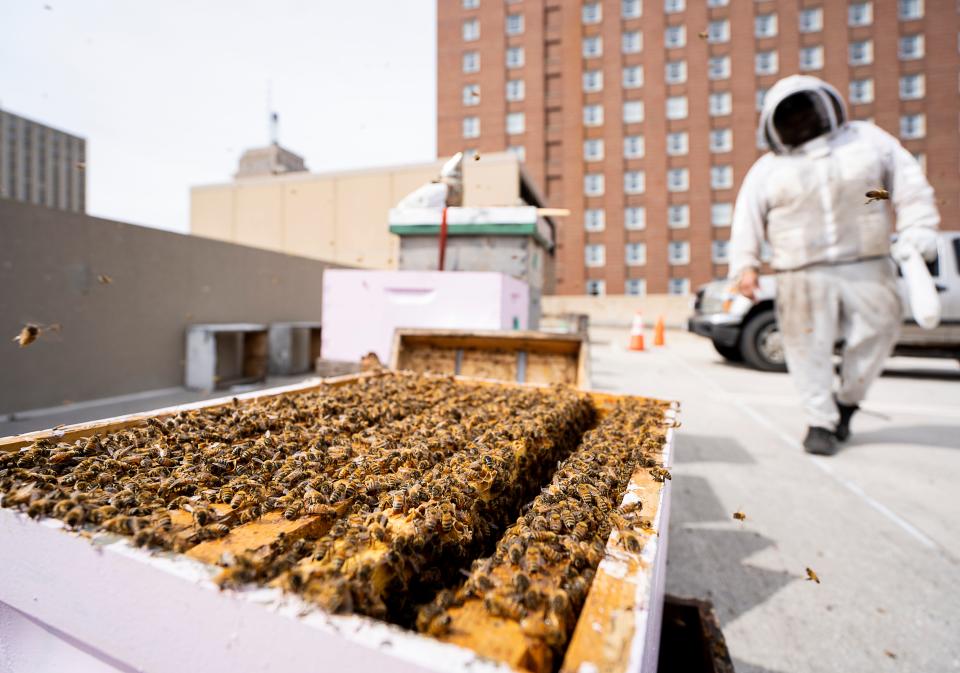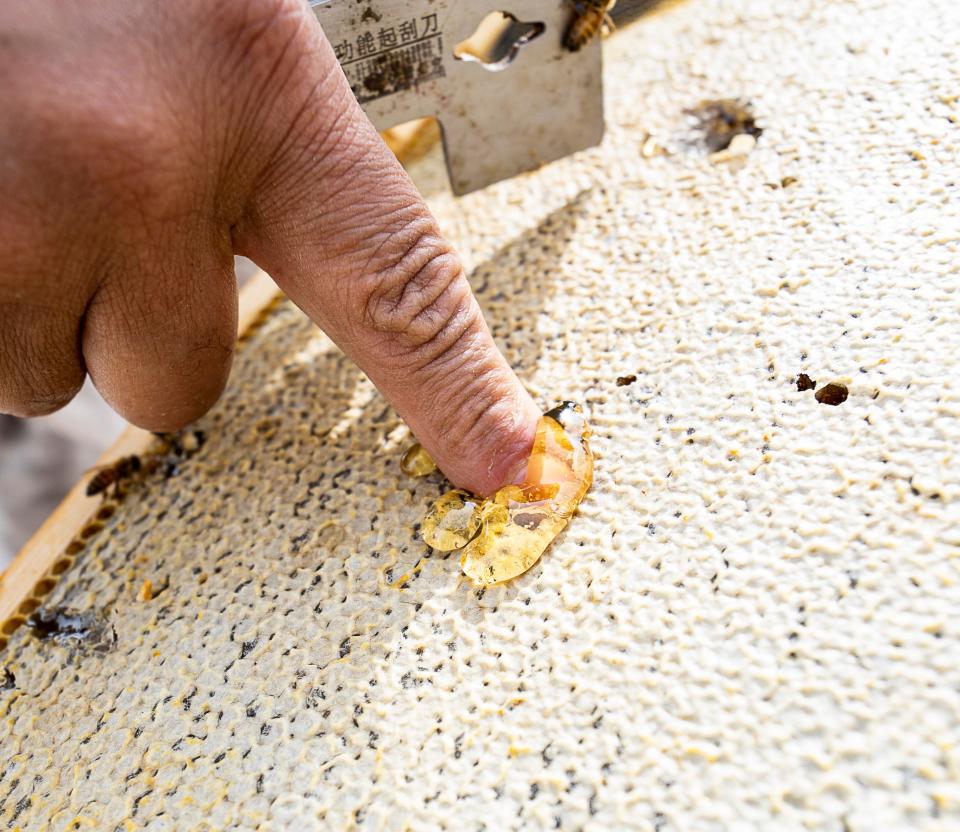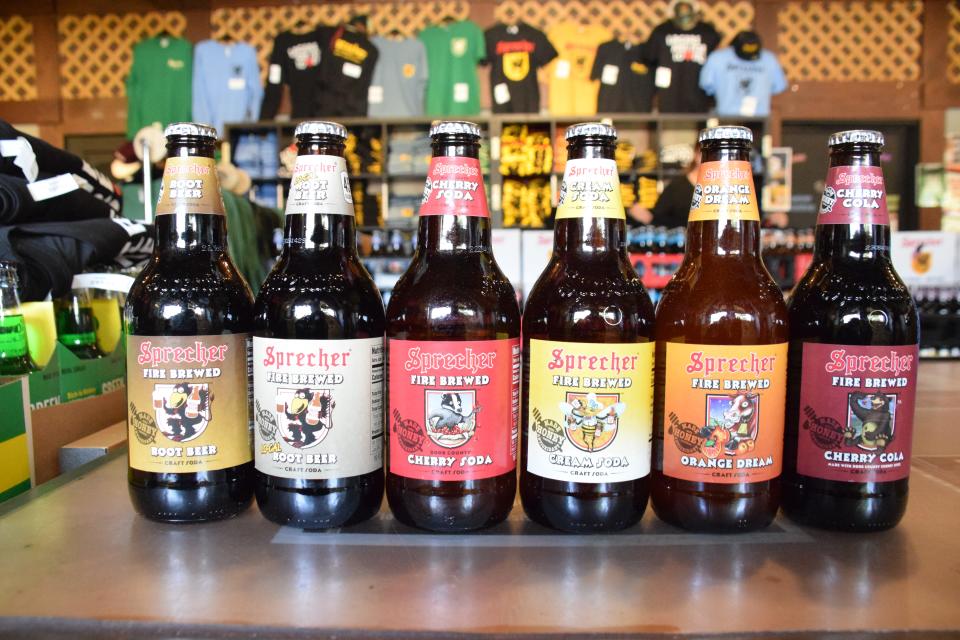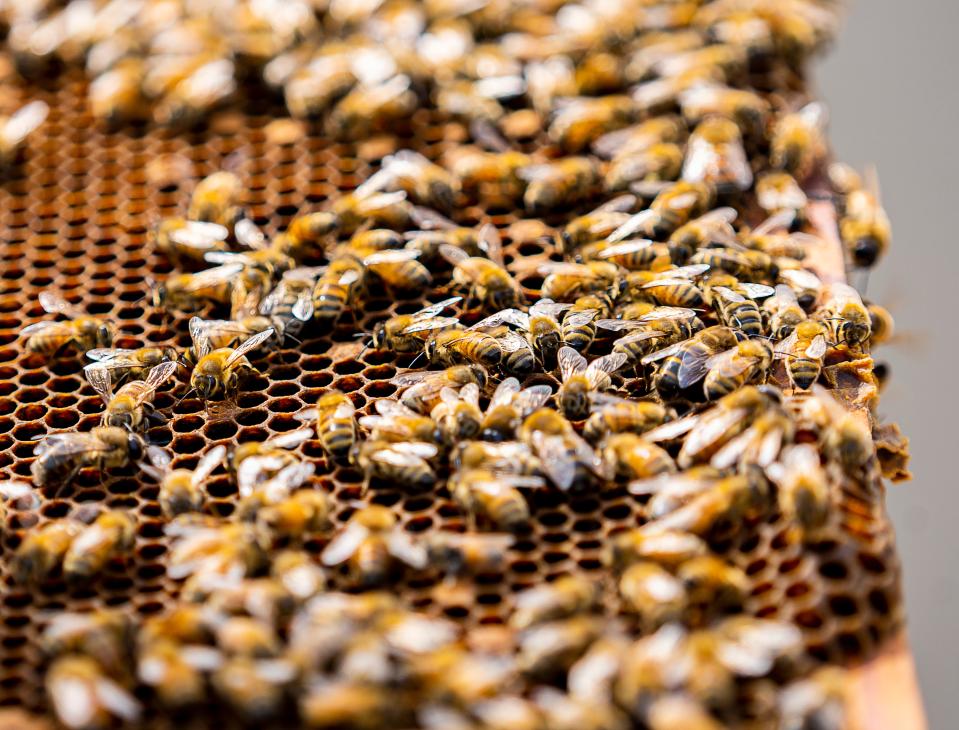For these Milwaukee beekeepers who supply Sprecher and others, honey is more than a hobby
Sprecher Brewery in Glendale has known for decades that local honey provides a depth of flavor that other sweeteners cannot match.
At the Milwaukee Chophouse, honey from beehives atop the Hilton City Center parking structure that are managed by Robert M. McKinney of MJD Apiary go into a variety of menu items including a bee’s knees cocktail with gin, honey sage syrup and lemon; honey ice cream alongside their signature chocolate cake; and a glaze on fried Brussels sprouts.
Pete’s Pops, Colectivo Coffee, Great Harvest Bread in Elm Grove and a number of local breweries all also use locally sourced honey to sweeten and flavor their products.
These local businesses are echoing — and in some cases modeling — the behavior of individual consumers who are taking advantage of urban or local beekeepers that aren’t hobby farmers, but trained and well versed in the science of honeybees. Through their expertise, Milwaukeeans have access to raw, local honey at farmers markets, orchards, stores and for online purchase that is unprocessed, unfiltered and delicious.
Honey has become more popular in recent years as the natural sweetener also has anti-inflammatory, antioxidant and antibacterial properties. Demand for honey in the U.S. reached an all-time high in 2021 as consumption of honey and made-with-honey products reached 618 million pounds — 22 million pounds more than the previous high in 2017.
Wisconsin beekeepers are helping to meet that demand — the state is 11th in the county in honey production. In 2022, more than 50,000 honey-producing colonies yielded more than 2.92 million pounds of honey in Wisconsin, which was nearly 1 million more pounds than was produced in 2021, according to the USDA National Agricultural Statistics Service.
Milwaukee bees produce flavorful honey
Bryan Bergner starts his day by stirring a spoonful of hot honey and a spoonful of regular honey into his black coffee. It gives the bitter brew just a touch of sweetness and a kick that he calls spectacular and an underrated use for honey. The practice is just a little bit sweeter because the honey he’s using has been collected from his own hives. Alongside his teenage son Miles, Bergner runs Highlands Honey. They have 31 beehives between their home in Wauwatosa’s Highlands neighborhood and a farm in Franksville.
Highlands is one of a number of local businesses that keep beehives in and around the city.
Urban beekeeping is unique because cities tend to be warmer than the countryside, where there are fewer windbreaks. In the city, buildings are close together and concrete absorbs and retains heat, which bees like. There tend to be more diverse flora and fauna, instead of fields of monocrops. And while use of mosquito spray is becoming an increasing problem, there tend to be far less pesticides in urban settings.
The City of Milwaukee allows up to two colonies of honeybees on private property within the city limits and requires a permit and inspection as well as notification of neighbors within 200 feet. That limits how much a beekeeper can do on their own land, but they often care for hives in multiple locations.
“Here in southeastern Wisconsin, the honey crop that we make off of the cornucopia of things that bloom, it's really good honey. Really, really good,” said Chris Werner of Indian Summer Honey Farm in Germantown.
The nutrients in the soil and the growing conditions fostered by Lake Michigan create a biodiversity in Milwaukee that leads to flavorful honey from the bees that are kept here.
More: Farmers markets, grocery stores and more spots to find local honey in the Milwaukee area
The science of making honey
Honey is the end result of a complicated process where the work is done by the bees, but the environment is created and monitored by the beekeeper. It’s the science of beekeeping that drives McKinney — he doesn’t even like honey, he said. But it’s the byproduct of learning about and caring for bees, and he is happy to share his love of it with anyone who wants to learn.

In the simplest terms, the process of making honey starts with bees gathering nectar — they have a separate stomach just for transporting the nectar. Honey is a result of the mixing of bee enzymes and nectar that is then cooled and dehydrated by the bees. Nectar is about 80% water, but honey is only about 60% water.
“The buzzing you hear by the hive is their wings. Their wings beat 231 times per second. What they’re doing is drying the nectar,” McKinney said.
Bees make honey to serve as an alternate food source for the hive, particularly through the winter months. It is their source of energy and is meant to ensure survival of the hive. But they make more honey than they need, and humans benefit.
The flavor of honey varies depending on the nectar the bees gather. Each plant produces different nectar and what plants the bees gather nectar from changes seasonally as different plants bloom. Most bees stay within a five-mile radius to collect nectar, so the flavor of honey is unique to the area in which it’s produced.

McKinney likened it to the terroir of wine, where temperature, precipitation, climate and soil composition all have an impact on the final flavor of a grape and the wine produced from those grapes.
The rich depth of flavor that comes from Werner’s honey has become the hallmark of Sprecher sodas and is one of the reasons their root beer has been named the Best in America by the New York Times, Tasting Table and others. Their repertoire of more than a dozen soda flavors are all brewed using honey from Werner and have been since he met Randy Sprecher at the Wisconsin State Fair in 1987. Everything at Sprecher is fire-brewed and Kecia Sprecher, vice president and Randy’s daughter, said heating the honey gives it a caramelization and complexity of flavor that customers have come to associate with Sprecher.
“Using honey means using less sugar. It adds a different character to any of the products we use it in. It’s a richer, more floral flavor and aroma,” said Sprecher Brewmaster Bill Gorecki.

Werner pursued beekeeping after an FFA advisor in high school suggested he look for an alternative to dairy farming. Werner liked that keeping bees kept him on and around farms. His business has grown to accommodate the demand from Sprecher over the years and he now keeps 4,500 hives.
“We want to know that whatever we’re doing, we’re doing some good with the hard work we and our bees have put in. With Sprecher it’s going all over the country. Just knowing that our honey is in those products is really cool,” he said.
All the beekeepers interviewed for this story stressed the importance of knowing the provenance of the honey a customer purchases. Locally harvested honey does not resemble the honey on big box store shelves because it is raw and unfiltered. It has not been diluted, processed or adulterated in any way — a massive problem on the worldwide honey market.
A common misconception about raw honey is that when it crystallizes, it has gone bad. That’s not true, McKinney said. Honey never spoils, but it will crystallize. Crystallized honey is not spoiled. The crystals form because the sugars separate. Warming the honey gently will bring it back to a liquid state.
The relentless wing flapping inside a hive to dry out the nectar also keeps the hive warm — about 95 degrees, according to McKinney. He advised never raising the temperature of honey above that. To liquefy it, he suggested using a water bath. Werner said he tells customers to put the honey out in the sun for a bit to bring it back to its semi-liquid state.
Beekeeping is a lot like coaching
Beekeeping is a delicate, oftentimes difficult and frustrating balance. It is a science and an art, said both McKinney and Werner. The beekeeper manages the colony, checks for disease, ensures the right numbers of workers and drones, checks production and serves as veterinarian, but ultimately, they cannot actually produce honey. They’re reliant on the bees. Werner likened his role to that of a coach while their athlete is running a race.
“We don’t have anything to do with (it). We're coaching from a distance. We don't interfere with them. We try not to manipulate them too much. We give them the space we feel they need and let them run the race, and then we reap the benefit, hopefully,” he said.

Beekeeping is not just a job or a hobby, but all-consuming. Bees are not always convenient and don’t keep a calendar, Bergner said. When there are issues in a hive, they must be addressed immediately. And even with years of experience and accrued knowledge, entire hives or colonies can die.
“(It) is a learning process. Every single time you open up a hive you learn something. You think you know what they're going do, and they throw you for a loop. Success comes from experience and from being willing to dig in and do what the bees need done for them at the time that they need it to be done,” Bergner said.
The field continues to expand, and new information is uncovered about bees and honey every year. The Bergners' backyard hives not only produce honey, but also serve as an educational tool. They have a show hive that is covered in plexiglass and sits on a table when they sell at markets. It’s a constant part of the job to clear up misconceptions (honeybees aren’t aggressive and are not the kind that are endangered and need saving) and educate the public about why they should be purchasing honey locally, Bergner said.
That accrued expertise on how to cultivate the bees and keep them happy, healthy and producing honey affects the price beekeepers choose to place on their wares.
“You think you’re just paying for a $17 jar of hot honey,” McKinney said. “But you’re paying for all the knowledge, all the time it took to get you the best product.”
This article originally appeared on Milwaukee Journal Sentinel: For these Milwaukee beekeepers, honey is more than a hobby

 money
money 